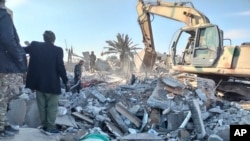The U.S. military said it carried out a “self-defense” strike late Sunday against cruise missiles in an area of Yemen controlled by Houthi militants.
U.S. Central Command said the strike hit four anti-ship missiles that were being readied to launch at ships in the Red Sea.
A CENTCOM statement said the missiles “presented an imminent threat to U.S. Navy ships and merchant vessels in the region.”
The strike was the latest move by the U.S. military against the Iran-backed militants to counter a series of Houthi attacks targeting vessels in the important shipping lanes of the Red Sea.
Earlier Sunday, White House national security advisor Jake Sullivan told CNN’s “State of the Union” show that U.S. President Joe Biden “will do what he thinks needs to be done” if there were more attacks against U.S. troops stationed in the Mideast or American naval vessels and merchant ships in the Red Sea.
Even so, Sullivan said the U.S. will “try to keep from (an) expanded war” in the Middle East even as U.S. and British forces have joined to hit Iranian-backed militants, again.
On Friday, the U.S. struck more than 85 targets linked to Iran’s Islamic Revolutionary Guard Corps and its proxies in Iraq and Syria in response to the killing of three U.S. service members at a Jordanian outpost where they were stationed.
Then, the U.S. and Britain hit at least 36 Houthi targets in Yemen on Saturday while the U.S. on Sunday launched what it described as a self-defense strike against a Houthi anti-ship cruise missile “prepared to launch against ships in the Red Sea.”
Sullivan said the U.S. is “still assessing the battle damage” from the attack on the Iran-backed militants in Iraq and Syria.
Asked how the U.S. would define success in the attacks, Sullivan said, “Each attack we undertake helps degrade capabilities” of the Iranian-backed militias in the region. “The U.S. will step up when it’s attacked,” but at the same time make sure the U.S. is “not pulled into a war in the Middle East. We will defend our troops.”
While the U.S. in recent days has said it was not looking to attack Iran directly, Sullivan said, “I’m not going to rule in or out” any attack inside Iran.
The Houthis made it clear Saturday that they are not backing down.
“Military operations against Israel will continue until the crimes of genocide in Gaza are stopped and the siege on its residents is lifted, no matter the sacrifices it costs us,” Mohammed al-Bukhaiti, a Houthi official, wrote on X. “American-British aggression against Yemen will not go unanswered, and we will meet escalation with escalation.”
Russia has requested an emergency meeting of the U.N. Security Council on Monday afternoon to discuss the U.S. attacks in the Middle East.
VOA White House bureau chief Patsy Widakuswara contributed to this report from Dover Air Force Base in Delaware. National Security correspondent Jeff Seldin also contributed.

